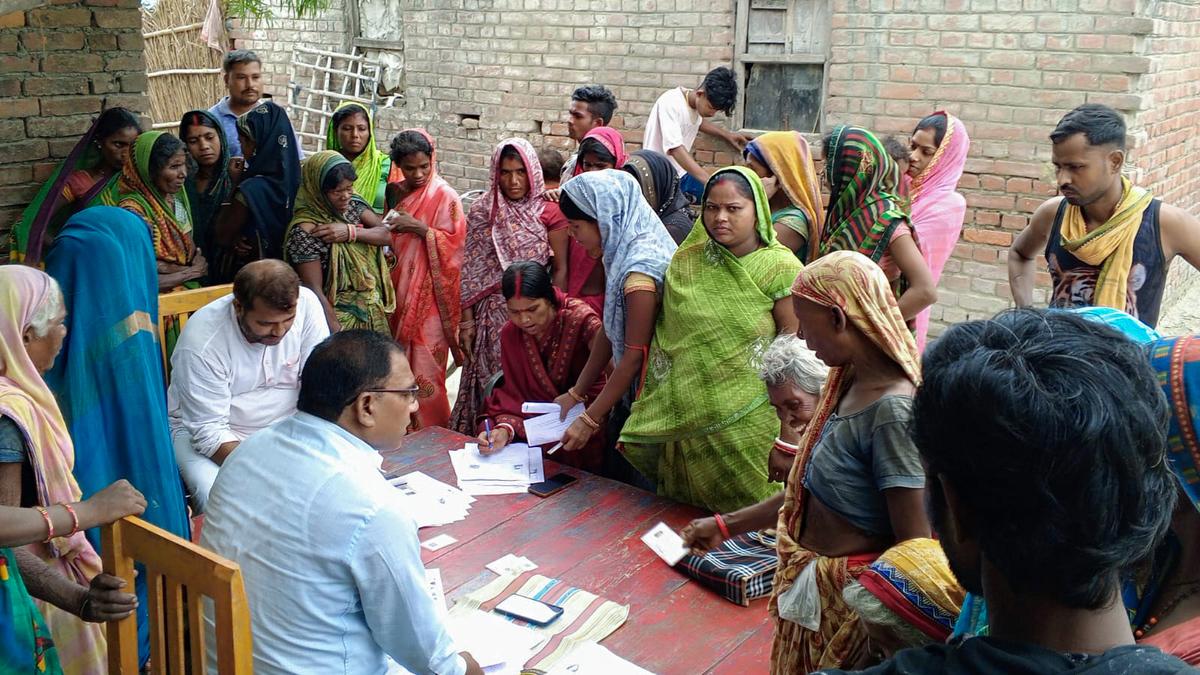This article forms a part of the Data Point newsletter curated by The Hindu’s Data team. To get the newsletter in your inbox, subscribe here
Welcome back, data enthusiasts!
As the Supreme Court is hearing a batch of pleas challenging the Election Commission of India’s (ECI) decision to undertake the Special Intensive Revision (SIR) exercise of electoral rolls ahead of Bihar’s Assembly elections, we at the Data team, published some stories to explain the context better using numbers.
The SIR was initiated due to what the ECI noted to be huge additions and deletions to Bihar’s electoral roll due to migration to other parts of the country and rapid urbanisation. As per the Indian Constitution, the ECI is obligated to make sure only citizens’ names are on the electoral roll.
The last such revision in Bihar was conducted in 2003, wherein enumerators were sent to verify names from door-to-door. The present SIR entails each voter submitting enumeration forms to their Booth Level Officers. No further submissions were required of those whose names were already on the 2003 electoral roll. However, electors registered after this date were required to submit documents establishing the date and place of their birth (and of their parents in some cases). This task was set to be completed in about a month.
The process of getting voters to submit these documents began on June 28, 2025. Following this, Rahul Shastri, a researcher associated with Bharat Jodo Abhiyan, wrote a piece for The Hindu’s Data Point, titled, “Voter verification drive in Bihar: too little time, too many hurdles”.
Mr. Shastri wrote about how this verification process will “disproportionately disenfranchise” poor and deprived electors. Further, the piece questions the ECI’s assumption that just 2.94 crore individuals will need to submit their eligibility documents. According to him, this number excludes the population who have passed away in the years since 2003, as well as those who have permanently migrated from Bihar.
This week, we published a story that questions a different aspect of the exercise, which is the availability of the required 11 documents amongst migrant workers in Bihar, as well as the awareness among them of which documents to submit.
The piece, titled “Bihar’s migrants lack SIR documents: Data” was written by Anindita Adhikari, faculty at the National Law School University of India, Bangalore and Rajendran Narayanan, faculty at Azim Premji University, Bangalore.
Here’s what published over the last two weeks:
For every child free for adoption in India, 13 parents wait in line: Data
We sourced data from an RTI reply received from the Ministry of Women and Child Development and concluded that India’s adoption system faces a severe mismatch between the children legally available and the thousands of parents waiting. This backlog reflects systemic inefficiencies and bureaucratic delays in the Central Adoption Resource Authority’s processes.
Damned if they do, or don’t: AIADMK’s impossible choice on alliance with BJP
We put out a piece highlighting the Catch-22 situation that the AIADMK finds itself in. Data from previous elections shows that in a three-cornered contest, the AIADMK struggles to win against a united DMK front. However, associating with the BJP risks leaving its ideology, alienating minority voters, and further weakening AIADMK’s base. The article concludes that both options could backfire: allying could damage the party’s long-term image, while going solo may lead to electoral defeat, leaving the AIADMK with no clear winning strategy.
Boys continue to outnumber girls in private schools in India | Data
As per data, while parents increasingly prefer private schooling over public, a considerable share of them still show a slight preference for enrolling their sons over their daughters.
In Odisha, crimes against women mount as courts and police falter
Amidst regularly reported cases of sexual harassment and related suicides and deaths, Odisha has the highest rate of crimes against women in the country, as per data from the National Crime Records Bureau. Data also show that only 10% of such cases end in conviction.
Here are this week’s News in Numbers:
Protest against the Unlawful Activities (Prevention) Act
| Photo Credit:
IDREES MOHAMMED
8,947
Number of individuals arrested under the UAPA between 2018 and 2022
Only two cases filed under the stringent anti-terror law, Unlawful Activities (Prevention) Act, were quashed by courts across the country between 2018 and 2022, Parliament was informed on Wednesday. In a written reply to a question in the Rajya Sabha, Minister of State for Home Affairs Nityanand Rai presented data from the latest NCRB report, which showed that 6,503 individuals were charge-sheeted under the UAPA during the period, while 252 people were convicted for the offences.
Source: PTI
51
Number of safety lapses found in Air India annual audit report
India’s aviation watchdog found safety lapses at Air India in its July audit, including lack of adequate training for some pilots, use of unapproved simulators and a poor rostering system, according to a government report seen by Reuters. The annual audit was not related to the deadly Boeing 787 crash last month that killed 260 people in Ahmedabad, but its findings come as the airline faces renewed scrutiny after the accident.
Source: Reuters
95.1
Share of Indian households with access to toilets
in percentage. In a written reply in Lok Sabha, Minister of State for Jal Shakti V Somanna quoted findings from the Swachh Survekshan Grameen 2023-24 conducted by the Department of Drinking Water and Sanitation. In terms of waste segregation, only 39.9 per cent households reported segregating waste into biodegradable and non-biodegradable categories, the survey said.
Source: PTI
Published – July 31, 2025 07:29 pm IST
